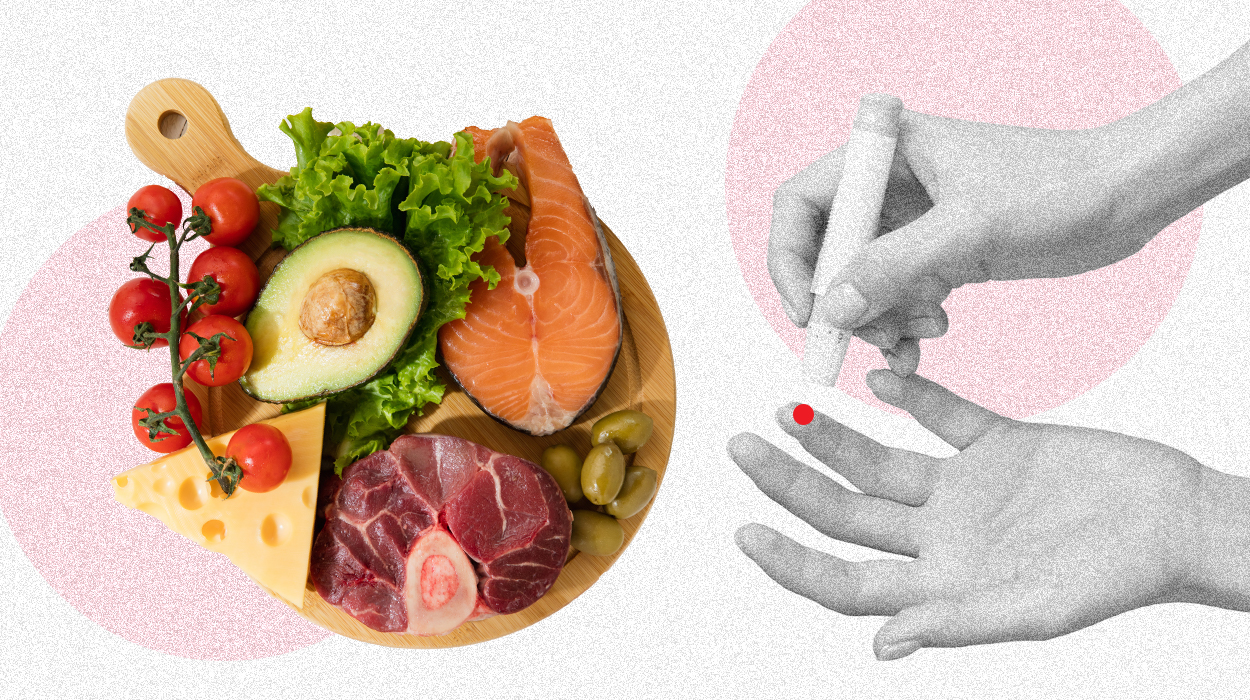 Expert's opinion
Expert's opinion
Expert's opinion
The article is a subjective view on this topic written by writers specializing in medical writing.
It may reflect on a personal journey surrounding struggles with an illness or medical condition, involve product comparisons, diet considerations, or other health-related opinions.
Although the view is entirely that of the writer, it is based on academic experiences and scientific research they have conducted; it is fact-checked by a team of degreed medical experts, and validated by sources attached to the article.
The numbers in parenthesis (1,2,3) will take you to clickable links to related scientific papers.
Ketone Levels For Ketosis: How To Achieve Ketosis In 2024?

If you’re trying to lose weight, you’ve probably heard of the keto diet or ketogenic diet. This diet has become quite popular over the last few years, but what is it? The ketogenic diet is a low-carbohydrate, high-fat diet.
With this diet, it is recommended to consume no more than 50 grams of carbohydrates per day with the rest of the calories to come from fat and protein.
Monitoring ketone levels is an important part of the ketogenic diet to ensure you don’t develop a dangerous condition called ketoacidosis. Learn about the keto diet ketones too high through this article.
What Should Ketone Levels Be For Ketosis?
When your liver breaks down fat for energy, this function is called ketosis. People who are on the ketogenic diet are attempting to reach this level for optimal weight loss. When consuming 20-50 grams of carbs per day, your body may reach ketosis in 2-4 days.
How fast you enter ketosis may vary depending on other factors such as age, stress level, and physical activity. 0.5 mmol/L is the level at which you are considered to be in a state of ketosis.
Ideal Ketone Levels For Ketosis
There is a wide range of ketone levels, with some being more ideal than others:
- 0.5 mmol/L-1 mmol/L: you have reached nutritional ketosis; this may be considered a “light” state.
- 1 mmol/L-3 mmol/L: optimal ketone level for weight loss.
- 3 mmol/L-5 mmol/L: optimal therapeutic ketone level for managing medical conditions such as epilepsy or diabetes mellitus (type II diabetes).
- 5 mmol/L-8 mmol/L: reached when fasting or consuming an increased fat-to-protein ratio level is not necessary and you should aim to stay within 0.5 mmol/L-3 mmol/L to avoid high ketone levels.
What Are Ketones?
So, what exactly are ketones? Ketones[1] are made when the liver breaks down fat and uses it instead of glucose, or sugar for energy. Typically, ketones show up when blood glucose and insulin levels are low, and in a person without diabetes, this is the body’s normal response to starvation.
This occurs at any time of the day or night, or during fasting. The fat cells travel through your bloodstream to reach the liver where they are turned into ketone bodies.
After the fat cells are turned to ketones, they travel back through your body to provide energy for muscles and tissues and contribute to your body’s metabolism. Without enough glucose, your body is forced to convert fat into energy.
3 Ways To Achieve Healthy Ketone Levels
Employ Intermittent Fasting
Intermittent fasting, or IF, is not eating for a certain period of time. This can be done on a daily or weekly schedule. IF can be effective for weight loss because you are limiting the number of calories you consume each day. There are many ways to do this, but a popular schedule to follow is the 16/8 schedule.
This entails fasting for 16 hours per day and consuming your daily calories during the other 8 hours. During the 16 hours of fasting, you may only consume water, black coffee, or other beverages with 0 calories.
Many people start their fast at bedtime and consume their first meal at lunchtime the following day IF can help you achieve ketosis because, during fasting, your body will run low on blood glucose and begin breaking down fat for energy production.
Intermittent fasting is not an overnight fix and many people don’t see results until week 2. How long does intermittent fasting take to work? It may take anywhere from 2 to 10 weeks for you to start noticing a change in weight.
To help aid your weight loss when using IF, make sure you are exercising, drinking enough water, and consuming healthy foods during your eating window. Although there are no restrictions when eating, it is important to fuel your body with healthy foods to optimize weight loss.
Remember to consult with a healthcare professional to see if this diet is safe for you.
Limit Your Carbohydrate Intake
Carbohydrates, or carbs made up of sugars, are the main source of energy for your body. Foods containing carbs include starches, grains, and fruits.
Low-carb diets are important for ketosis because when carbs are broken down into glucose, some of it is used for energy, but the rest are turned into glycogen stores, which turn into fat.
By following the keto diet for ketones too high, you limit the amount of sugar your body stores and force it to burn fat instead. High-carb foods include:
- Pasta
- Bread
- Sweets
While some low-carb diets limit starchy vegetables and fruits, other plans allow a small amount of these foods. There are several apps available as well that can help you track your carb intake, calorie intake, exercise, and more!
You may have noticed many supplements on the market today, promising to help you achieve ketosis and increase weight loss. Many supplements contain beta-hydroxybutyrate, which is the body’s most prevalent ketone.
Claims state that BHB can increase mental clarity and improve nerve function. Ask your doctor if supplements are right for you.
Exercise
Exercising while following a ketogenic diet is effective in burning stored fat. Since the ketogenic diet is high fat and low carb, the body will have no choice but to burn fat. Some fat-burning exercises include running, swimming, squats, or push-ups.
When exercising, remember to drink a lot of water.
Are Your Ketone Levels Too High?
If your body produces too many ketones too quickly, they can build up in your bloodstream and become dangerous. Excessive ketones prevent your body from making enough insulin, which plays a crucial role in controlling your blood sugar. Can your ketones be too high on a keto diet? If your ketone levels are too high:
- Seek medical attention immediately: this can be a life-threatening condition called ketoacidosis.[2]
- Symptoms of ketoacidosis include dry mouth and skin, fruity-smelling breath, extreme tiredness, and nausea or vomiting.
- Diabetics may experience a condition called diabetic ketoacidosis which requires immediate medical attention.
- When left untreated, ketoacidosis can cause a diabetic coma, which is loss of consciousness due to imbalances in blood sugar, or even death.
How To Measure Ketone Levels
Ketone testing[3] like blood ketone levels for ketosis or urine ketone levels for ketosis can be at home done using a blood ketone meter or a urine test strip. To use a blood ketone meter, you will prick your finger with a small device containing a needle, called a lancet. The blood sample will be placed onto a test strip inserted into the ketone meter.
This reading will show you the amount of ketones in the blood. To do a urine test at home, you will collect a small amount of urine and use ketone strips to determine urine ketone levels. Make sure to report high ketone levels to your physician to ensure you aren’t at risk of developing ketoacidosis.
How Often Should You Measure Ketone Levels?
When starting a ketogenic diet, you may want to measure your ketone levels twice a day. It is recommended to do this while fasting, such as before breakfast, and before dinner when you have fasted for at least 2 hours. A test may also be warranted if you have symptoms of ketoacidosis or high ketones.
Conclusion
In conclusion, the keto diet can be a great way to lose weight. It is important to make sure you are measuring your ketone levels often and reporting symptoms of ketoacidosis to your primary care provider immediately or seeking emergency medical care.
Keto diet ketones too high can be a medical emergency. Implementing intermittent fasting, following a low-carb diet, and exercising can be a great way to achieve ketosis. Use blood or urine test strips to see if you have reached ketosis.
By monitoring the level of ketones in your blood, you can make sure that you are reaching optimal levels while still being safe. People with diabetes should consult their healthcare provider before attempting to reach ketosis on their own, as they may experience diabetic ketoacidosis.
Frequently Asked Questions
Low-carb high-fat diets cause your body to use fat instead of glucose for energy.
High ketones can be dangerous, especially if you have diabetes. This can cause a diabetic coma.
Intermittent fasting, low-carb intake, and exercise are great ways to start a ketogenic diet.
This is done using a blood ketone monitor. Ketones can also be measured in urine if you aren’t comfortable obtaining a blood sample on your own.
+ 3 sources
Health Canal avoids using tertiary references. We have strict sourcing guidelines and rely on peer-reviewed studies, academic researches from medical associations and institutions. To ensure the accuracy of articles in Health Canal, you can read more about the editorial process here
- Diabetes Education Online. (2011). Ketones – Diabetes Education Online. [online] Available at: https://dtc.ucsf.edu/types-of-diabetes/type2/understanding-type-2-diabetes/how-the-body-processes-sugar/ketones/
- CDC (2021). Diabetic Ketoacidosis . [online] Centers for Disease Control and Prevention. Available at: https://www.cdc.gov/diabetes/basics/diabetic-ketoacidosis.html
- Medlineplus.gov. (2022). Ketones in Urine. [online] Available at: https://medlineplus.gov/lab-tests/ketones-in-urine/



